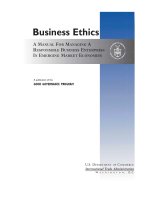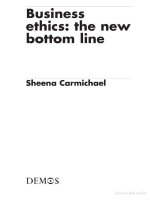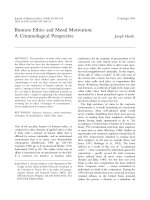Global business ethics lesson 05
Bạn đang xem bản rút gọn của tài liệu. Xem và tải ngay bản đầy đủ của tài liệu tại đây (1.42 MB, 11 trang )
41
Ethics in Marketing
and Consumer Protection
UNIT 1
UNIT II
42
Global Business Ethics
43
Ethics in Marketing
and Consumer Protection
LESSON
5
ETHICS IN MARKETING AND CONSUMER PROTECTION
CONTENTS
5.0
Aims and Objectives
5.1
Introduction
5.2
Ethics: Concept and Consequents
5.3
Unethical Practices - The Cause
5.4
Establishing Ethical Standards
5.5
Ethics and Marketing
5.6
Consumer Protection Act
5.7
5.6.1
Pecuniary Jurisdiction of the Redress Tiers Raised
5.6.2
State Commission to have Multiple Benches
5.6.3
District Forum Empowered to Give Punitive Awards
5.6.4
Review of Orders by National Commission
5.6.5
Power for the District Forum to Attach Property
Culture
5.7.1
Cultural Impact
5.7.2
Cultural Diversification
5.8
Let us Sum up
5.9
Lesson End Activity
5.10
Keywords
5.11
Questions for Discussion
5.12
Suggested Readings
5.0 AIMS AND OBJECTIVES
After studying this lesson, you should be able to understand:
z
The ethics, concepts and consequents
z
The unethical practices
z
The ethics and marketing
z
The Consumer Protection Act
z
The cultural impact and diversification
5.1 INTRODUCTION
The question in marketing is: Why should marketers worry about ethics? What role do
moral values play in an economic system? Do competitive pressures conflict with
ethical considerations in marketing? Does the legal system provide too many or too
44
Global Business Ethics
few ethical constraints on the marketer? While most marketers have always been
conscious of ethical considerations, today's climate of consumerism renders many
traditional attitudes obsolete. Marketers must adopt a broadly based view of ethics if
they really want to understand and meet the needs of today's customers.
Is marketing completely unethical? More extreme critics appear to think so. Others
find it hard to see anything unethical about attempting to meet customer's needs with
appropriate goods and services. These contrasting view points span a variety of
differing opinions on what constitute ethical practice in marketing. In this lesson, we
provide to explore the issue raised by these opinions and to provide some guidance to
the marketer, who is increasingly be leagued by ethical criticism.
Marketing consists of the performance of business activities that direct the flow of
goods and services from producer or manufacturer to consumer or user. A number of
distinct functions are coming under this broad characterization which includes:
z
Product Development
z
Distribution
z
Pricing
5.2 ETHICS: CONCEPT AND CONSEQUENTS
Ethics necessarily implies some set of criteria by which to judge the merits of a given
act. These criteria are moral value, or the rules of conduct deemed acceptable by
society at a given time.
For the marketer, whose promotional activities render him a very visible agent in
society, two acute problems emerge from the definition of ethics. Society is by no
means homogeneous in its ethical values.
Ethical values though defined 'at a given time', are not fixed and unalterable. They
change over time.
The focus of ethics is normative, 'what should be', rather than 'what is', notions of the
ideal vary from group to group and from time to time. Marketers who wish to avoid
criticism of their ethics are faced therefore with the unenviable task of attempting to
make decisions which do not necessarily conflict with variety of changing ethical
ideals. This type of balancing act should not, however, be strange to the marketer.
Example: Segmentation strategies reflect social heterogeneity. Yet marketing seems
able to adopt to this complexity reasonably well. It would be a very unperceptive and
probably unsuccessful marketing manager who did not recognise the fact that markets
of the nineties will differ from those of the seventies or eighties. Change and
adaptation are not new to him.
However, the ethical problems of the marketer can be painful. Swept by the rising tide
of consumerism, business leaders who perceive themselves as acting with
commendable moral diligence are pilloried by consumerists whose moral percepts are
quite different. For example, the controversy over television advertising to children.
Until nineteen sixty, there were virtually no guide lines or disapprobation. Some
questionable marketing practices were not unknown. Over the years these have
changed to depict product features and benefits more accurately. Some interest groups
and individuals remain adamantly against any children's advertising on principle.
Such fundamental differences are clearly difficult, to resolve on logical or empirical
grounds.
Many managers regard adherence to legal standards as sufficient guarantee of ethical
acceptability. But in most cases, the law represents the only available written
embodiment of ethical standards. However, at least in part, because of the nature of
political and legislative processes, adherence to legal standards provides no guarantee
of freedom from ethical criticism. The concern of consumerists focuses on the
inadequacy of existing law.
5.3 UNETHICAL PRACTICES - THE CAUSE
The major cause is undoubtedly the pressure of competition. Unless a firm can turn
ethical restraint to competitive advantage, it has little economic motivation to
maintain higher ethical standards. With more widespread activism and concern on the
part of the consumers, the chances that economic benefits will accrue to the more
ethical market are definitely enhanced.
Although ethics and profits are not necessarily mutually inconsistent, there is quite
often little likelihood or immediate economic benefit to the more ethical competitor.
Legal standards represent the only set of rules which the competition may be expected
to obey; the astute manager will also adopt them. If a given firm or manager wished to
employ more stringent standards, it could not without risking possible loss or profits!
Another factor bearing on ethical conduct is the prevailing practice in a department,
firm or industry. The influence of such practices may cause a manager to act in a way
that he would otherwise consider unethical. Prevailing practice becomes the dominant
influence.
The time span within which decisions are made also favors the expedient over the
conscientious decision. Even though the marketer may believe that ethical conduct
will produce more profit in the long-run, emphasis On immediate profits and the
short-run focus of managerial objectives and evaluation systems often tend to prohibit
a long-run view.
Mitigating against the various pressures towards unethical behaviour are opposing
forces including in many cases, the values of the manager. Consumer and religious
groups and the publicity they generate also have an inhibitory effect, as do
investigative report by the media.
Government agencies, by no means insulated from the pressures of public opinion are
frequently in a position to exert direct influence on marketers to change their
behaviour.
The attempts by various business leaders, companies, associations, and professional
bodies to establish and maintain ethical standards of behaviour undoubtedly
countervail some of the tendencies to unethical behaviour.
5.4 ESTABLISHING ETHICAL STANDARDS
The considerable concern over ethics is reflected in the large number of organisations
that have attempted to codify ethical standards. Such codes are usually based upon
legal standards, industry practice, religious ethical ideals, and the values professed by
their developers etc. Standards must be communicated before they can be effective. It
can certainly be argued that there are merits to an explicit statement of ethical ideals.
The exercise seems futile, however, unless employees or members comply with those
standards. Ensuring compliance is a weakness of most codes. For the manager who
wishes to secure subordinate's adherence to a set of ethical standards, there is no
practicable alternative to making those standards part of the system of performance
evaluation, and control.
For maintaining ethical standards in marketing, the firm itself must provide the
standards and the control system, should it not be satisfied with existing performance
Implications.
These are Ethical attacks on marketing will continue, as long as there is heterogeneity
of opinion over what are the 'right' moral values, there will be conflict. There is also
45
Ethics in Marketing
and Consumer Protection
46
Global Business Ethics
an inherent danger of the competitive system inducing downward spiraling of ethical
standards, to a lower bound set by legal standards.
A good case can be made that it is unfair to expect firms in competitive industries to
do other than stay within the law Critics must look to the law, rather than spontaneous
action of companies for setting new ethical standards for marketing practice. Only
then consistent standards may be obtained.
Many marketing managers do not view the regulatory incursions of government
dispassionately. The onus on those who feel the way is to provide a non-governmental
remedy, through establishing and maintaining by management control, effective
ethical standards for company decisions. A first step toward such a system is to open
up lines of communication to those who criticize marketing ethics.
5.5 ETHICS AND MARKETING
Ethics are standards of moral conduct. To act in an ethical fashion is to conform to an
accepted standard of moral behaviour. Undoubtedly, virtually all people prefer to act
ethically. It is easy to be ethical when no hardship is involved i.e., when a person is
winning and life is going well. The problem comes when it is the other way-Pressures
build. These pressures arise in all walks of life; marketing is no exception. Marketing
executives face the challenge of balancing their own interests in the form of
recognition, pay, and promotion, with the best interests of consumers, their
organisations and society into a workable guide for their daily activities. In any
situation, they must be able to distinguish what is ethical with unethical and act
accordingly, regardless of the possible consequences. Many organisations have formal
codes of ethics that identify specific acts (bribery, accepting gifts etc.) as unethical
and describe the standards employees are expected to live up to these guidelines
lessen the chance that an employee will knowingly or unknowingly violate a
company's standards. Codes of ethics strengthen a company's hand in dealing with
customers or prospects that encourage unethical behaviour. For young or
inexperienced executives, these codes can be valuable guides, helping them to resist
pressure to compromise personal ethics in order to move up in the firm.
Every decision cannot be taken out of the hands of the manager. Determining what is
right and what is wrong can be extremely difficult. It is not possible to construct in an
organisations to construct a two column list of all possible practices under the
headings 'ethical' and 'unethical.' A marketer also finds it difficult to evaluate a
situation and formulate a response.
Arthur Anderson and company has developed an ethical reasoning model that can be
taught to current and future managers.
The procedure consists of:
Step 1: Identifying the decision options and the likely consequences of each.
Step 2: Identifying all individuals and organisations that will be positively or
negatively affected by the consequences of each option.
Step 3: Estimating the negative impact (costs) and positive impact (benefits) of each
option from the point of view of each affected party, taking into consideration their
particular interests and needs.
Step 4: Ranking the costs and the benefits of each option and making a decision.
This approach is an attempt to be systematic and logical in ethical decisions. It works
only if the decision maker can be objective and impartial. Ethical situations are freely
charged with emotion. An alternative approach that attempts to personalise the
situation may be more effective. Faced with ah ethical problem, one should be honest
in answering the following questions which indicates the route to follow:
z
Would I do this to a friend?
z
Would I be willing to have this done to myself?
z
Would I be embarrassed if this action were publicized nationally?
Check Your Progress 1
1. What is ethics?
…………………………………………………………………………….
…………………………………………………………………………….
2. What is the major cause of unethical practices in marketing?
…………………………………………………………………………….
…………………………………………………………………………….
5.6 CONSUMER PROTECTION ACT
Changes, the good and the Unnecessary
Recently the Consumer Protection Act, 1986 was further amended. Let us look at a
few amendments and their relevance.
Act not for commercial purpose
What does this mean’ An answer must be preceded by looking at how the old Act was
used to expand the scope of the Consumer Protection Act of 1986.The old Act
allowed small business person-for example, a tailor-to seek redress for free repair or
replacement of the tools/machinery used in their business. But lawyers have the ability
to expand the scope of any law, and with District Forum and the State Commission
lax in their approach, large companies began to benefit by this law. A main advantage
was that they did not have to pay the heavy stamp fee to the courts. Thus, for example,
a large textile mill, which bought a few genets, approached the consumer forum
seeking replacement of a defective one.
Soon the Consumer Forum and the State Commissions were loaded with litigations
which could have been handled by civil and criminal courts. The latest amendment
shuts the door for any commercial activity. Not even a tailor can approach the
consumer forum fir redress,
While this is welcome, the amendment could have been such that the spirit of the
primary Act was retained. For instance, the amendment could have allowed only
individual, who are defined as consumers, and those who practice a trade or run
single-person enterprises to seek redress under the CPA.
5.6.1 Pecuniary Jurisdiction of the Redress Tiers Raised
A new amendment allows the District Consumer Forum to entertain complaints up to
Rs. 20 lakh. But how many articles bought by individual cost so much? Why, then
raise the pecuniary jurisdiction? Consumer Forum and the State Commissions award
little compensation for loss of income, mental agony and anguish, etc. Compensation
rarely exceeds a few lakh rupees.
Continuing this to allow original complaints at the National Commission of pecuniary
jurisdiction beyond Rs.1 crore, to my mind, is simply ridiculous; District Forum or the
State Commission can pass the interim order. This is a good amendment. With the
application of other provisions in the Consumer Protection Act, and including the
clauses taken out from the MRTP Act on unfair trade practices, this amendment
becomes very useful. The use of this provision will be available in many other
47
Ethics in Marketing
and Consumer Protection
48
Global Business Ethics
instances also. For instance, an insurance company receives an accident claim, say for
Rs.50,000. The insurance company wants to settle for Rs.10,000. But the consumer is
not satisfied and therefore petitions the District Forum. The District Forum can order
an interim payment, if convinced with the consumer’s case, and asks the insurance
company to pay a minimum sum.
This provision will also help, say, if large-scale adulteration is detected. While the
District Forum or the State Commission can take up this matter on a petition, they can
immediately on receipt of the petition, order the alleged defaulters to stop selling the
product. This amendment can be very useful in restraining unscrupulous traders,
manufacturers and service provider from taking advantage of consumers.
5.6.2 State Commission to have Multiple Benches
This is an important amendment, especially as thousands of cases remain pending for
years. With little support from the Department of Consumer Affairs, and Consumer
Welfare Fund, it is possible to set aside some money to create multiple benches for all
State Commissions.
5.6.3 District Forum Empowered to Give Punitive Awards
Again, this is important, as the District Forum can now be a little more generous in
awarding damages. The District Forum should be able to award punitive damages
when a registered appointment letter is not delivered in time and a person fails to
secure a job. Of course, the consumer must be able to prove that an appointment order
fixing a date of joining duty was not received on time and, therefore, a career
opportunity was lost.
Similarly, the loss of a limp or disability due to negligence leading to loss of income
for a period must also considered for punitive damages. This should also be followed
in certain cases of insurance claims. While the amendment offers considerable scope,
the problem might be in proving a petitioner’s point if view.
5.6.4 Review of Orders by National Commission
It is possible that the petitioner/consumer dose not agree with an order of the National
Commission. Instead of going for an appeal to the Supreme Court, it is now possible
to ask a review of the order.
5.6.5 Power for the District Forum to Attach Property
A survey of how effective were the orders of the District Forum and the State
Commissions revealed that in many a case though the consumer got a favorable order,
the final outcome was zero as the order could not be enforced. A new amendment to
the Act allows the Consumer Forum and State Commission to ask the District
Collector to recover the amount due to the consumer by attachment and sale of
property. This is an important and useful amendment.
While all these change are useful for the Consumer Protection Act to be consumer
friendly, further amendments are necessary. But the most important thing to remember
is that the consumer protection law intended to be quick, simple, effective and
inexpensive. One hopes that the Consumer Protection Act will be implemented with
its original spirit and zeal.
Check Your Progress 2
What is the new amendment in the Consumer Protection Act, 1986 regarding
review of orders by National Commission?
…………………………………………………………………………………...
…………………………………………………………………………………...
5.7 CULTURE
Culture can be defined as all the ways of life including arts, beliefs and institutions of
a population that are passed down from generation to generation. Culture has been
called "the way of life for an entire society." As such, it includes codes of manners,
dress, language, religion, rituals, norms of behavior such as law and morality, and
systems of belief as well as the art.
5.7.1 Cultural Impact
Cultural Impact is the effect the culture has on a particular region, habit, place, events
etc. cultural impact has a varied effect. It may be high, low or even negligible level of
effect. Some examples of Cultural Impact are the effect on super bowl on purchases,
Impact of I-Way on Internet Behaviour etc.
5.7.2 Cultural Diversification
Cultures can be born from centuries of input; they can also be erected in a matter of
days if not hours! Individual streets, towns and countries have their own cultures!
Office workers and coal miners have their own workplace style or environment!
Seafarers have a culture, not only as a collective but onboard their individual vessels!
Even pubs, restaurants and camper van parks have their very own ways, ones that
belongs solely to that particular establishment or group.
Cultures can be changed and adapted, destroyed or made monumental! They might be
set down on paper, unbreakable through finite detail and with strenuous clauses that
will last through the centuries. They could also be a product of word of mouth or even
less a result of silent acquiescence that might adapt or change as situations or people
demand!
Cultural diversification makes this world an extremely interesting to live in. To be
different and to find out that 'my way is not the only way' is ultimately exciting.
Cultural diversification should be embraced and grasped by everybody, not shunned
or demeaned through lack of understanding as it so often is. To be different, to be an
individual is worthy of existence, whilst to be all the same would ultimately result in a
total lack of identity, not to mention the fact that if everybody was the same life would
be very boring indeed.
Understanding the Cultural Diversification Process
The cultural diversification process also deals with one of the most volatile,
challenging, and demanding issues in the last 6,000 years of history and the last 500
years of modern history. Human relations will be one of the central, and determining
factors for the 21st Century. Either we will learn to live together in peace, with mutual
tolerance acceptance and appreciation as our social protocols, or we will be faced with
increasing conflict in a futile effort at resisting irreversible global environmental,
demographic, and economic forces that are changing the reality of life on planet earth.
The challenge today is for each tribe to find its place in the global/super-tribal society.
Check Your Progress 3
Fill in the blanks:
1. Consumer Protection Act, _______.
2. _______ makes this world an extremely interesting to live in.
3. _______ will be one of the central, and determining factors for the 21st
Century.
49
Ethics in Marketing
and Consumer Protection
50
Global Business Ethics
5.8 LET US SUM UP
Mahatma Gandhiji, The Father of our Nation, has said “The customer is not an
interference in our Business. He is the very purpose of our Business’’. Markets do not
exist in vacuum. People are the markets. Products and services are meant to enhance
the comfort and welfare of the consumers. If marketing takes care of the welfare of
the consumers, sales revenue would automatically multiply.
5.9 LESSON END ACTIVITY
List down unethical marketing behaviours found in various marketing areas. Explain
each of them.
5.10 KEYWORDS
Marketing: Flow of goods and services from producer/manufacturer to consumer or
user.
Culture: The ways of life passed down from generation to generation.
5.11 QUESTIONS FOR DISCUSSION
1. Enumerate the role of ethics in marketing.
2. Explain cultural impact on cultural diversification.
3. What is healthy competition? Give examples to substantiate your answer.
4. Elucidate the laws protecting consumer’s interests.
5. Explain ethical and social issues in advertising?
Check Your Progress: Model Answers
CYP 1
1. Ethics necessarily implies some set of criteria by which to judge the merits
of a given act. These criteria are moral value, or the rules of conduct
deemed acceptable by society at a given time.
2. The major cause is undoubtedly the pressure of competition. Unless a firm
can turn ethical restraint to competitive advantage, it has little economic
motivation to maintain higher ethical standards.
CYP 2
It is possible that the petitioner/consumer dose not agree with an order of the
National Commission. Instead of going for an appeal to the Supreme Court, it is
now possible to ask a review of the order.
CYP 3
1. 1986
2. Cultural diversification
3. Human relations
5.12 SUGGESTED READINGS
Manuel G. Velasquez, Business Ethics.
Laura P. Hart Man, Business Ethics.
John R. Boat Right, Ethics in Conduct of Business.
William A. Wines, Ethics Law and Business.
51
Ethics in Marketing
and Consumer Protection









